Death notes - 7 thoughts on death
post by Nathan Young · 2024-10-28T15:01:13.532Z · LW · GW · 1 commentsThis is a link post for https://nathanpmyoung.substack.com/p/death-notes
Contents
Slowly, then all at once All at once, then slowly Never Always Now The excavator Putting one’s affairs in order None 1 comment
Both my grandmother and my great aunt passed away recently, which has caused me to muse upon death.
Slowly, then all at once
What is death? I guess it's the ending of the process of consciousness. Not that we really know what consciousness is?
In that sense, do I die when I go to sleep? My consciousness in the morning often seems pretty unconnected to the consciousness of the night before. Things that seem so important when I go to bed seem trivial when I wake up. What does the waking Nathan owe the man from the night before? I don't believe in souls, so what connects me to future Nathan?
I was a Christian five years ago. What would that Nathan think about how I use the knowledge, resources and pattern of consciousness he bequeathed to me? Would he consider it a death? The light has been refracted so many times as to be going in a very different direction. Why should I entrust my possessions to future Nathan, rather than giving them away[1]?
I guess that people have the sense that only the ending of the pattern of consciousness matters, rather than its shift over days or weeks. That I am still, legally and fundamentally “Nathan”, regardless of what past Nathan might think about me.
I find this becomes more difficult when someone is slowly dying. My great uncle is losing his memory and his ability to understand speech. He sometimes becomes violent, despite having been a fairly easy going man in his time. Is this not a kind of death - his consciousness slowly being railroaded by unfortunate genes? I have heard accounts (n = 1-3) of dementia patients becoming entirely unlike their previous selves. To see someone you love become someone you don’t care for seems a torture almost deliberately selected for cruelty.
All at once, then slowly
In Robin Hanson’s Age of Em, our minds have been all uploaded and whatever causes them to decay has long since been solved. There is likely no upper bound to how long a mind can exist, so it becomes a question of who can afford to. But rather than poverty leading to death, one can only afford to run on slower and slower servers (as compared to the breakneck pace of the technological elite[2]). Perhaps a group of us retire together, opening the morning paper each morning to discover what the last 3 years of elite history have been like.
I find this both comforting and brutal.
It’s comforting that there is functionally no death - smearing retirement across longer and longer objective time means that very large retiring populations can be supported by comparatively small working populations[3]. It seems unjust that my little gran, who only ever pootled round her house and up the lane with her friends, should ever have died. In em-world, her life would have been cheap to simulate and I could have kept her round to visit once every few months[4]. While I tidied her house this week, several times I thought I heard her voice and I feel confusion at a world that permits death like this.
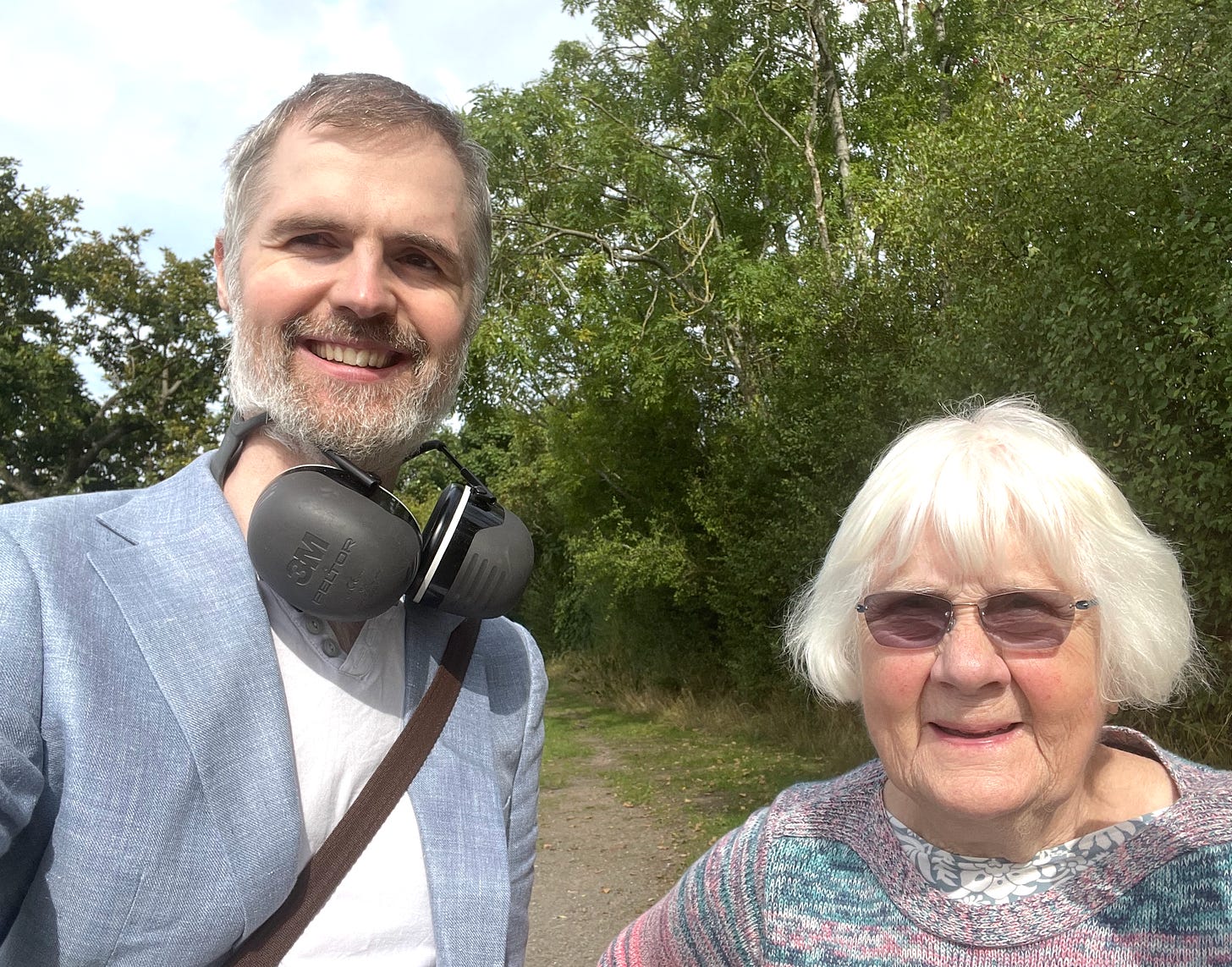
But it’s brutal to see current retirees in terms of whether they pull their weight. Do they have enough resources to pay for their current upkeep[5]? Would society pay to keep them alive? Would I pay much to simulate my great uncles current existence, unable to hear properly, stuck in a small smelly room? I don’t think so, and I’m not sure he would? His life is difficult and he wishes to “go home to the Lord”. Some care homes cost a thousand pounds a week, some far more, some a bit less. My remaining grandmother stays in a pleasant care home, but every few months she lives, a person in Africa could be saved from death. And I love my Grammie, but I find it hard not to think that an injustice too.
Never
Death is bad.
Often when considering decisions it’s good to imagine one started at some other equilibrium. If there were no death, would we invent it? Perhaps there would be a tyranny of the old, with the elderly never stepping aside. Though we seem to have that in the USA already - if death is a part of life, why aren’t we crying to cut lifespans back twenty years?
If we lived to 200, or 1000, there would be new problems, but I don’t think we’d want to return to where we are now.
For a longer exploration of this theme, especially if your response is that death is “natural”, I recommend listening to The fable of the dragon tyrant by Nick Bostrom.
Always
There is the Christian frame too. That death is in fact the start of the bigger story.
At my great aunt’s funeral on wednesday, the service was hopeful. Betty had gone to be with her saviour. People did not talk as if she was dead, they talked as if she was on a long journey, alive but somewhere else. There was sort of a peace and softness to this. I like hymns. I like discussing the life of a person who embodied their own values and was either good or kind. My only criticism was a kind of disembodiedness to it. Somehow several times I forgot it was a funeral, despite the coffin being there[6].
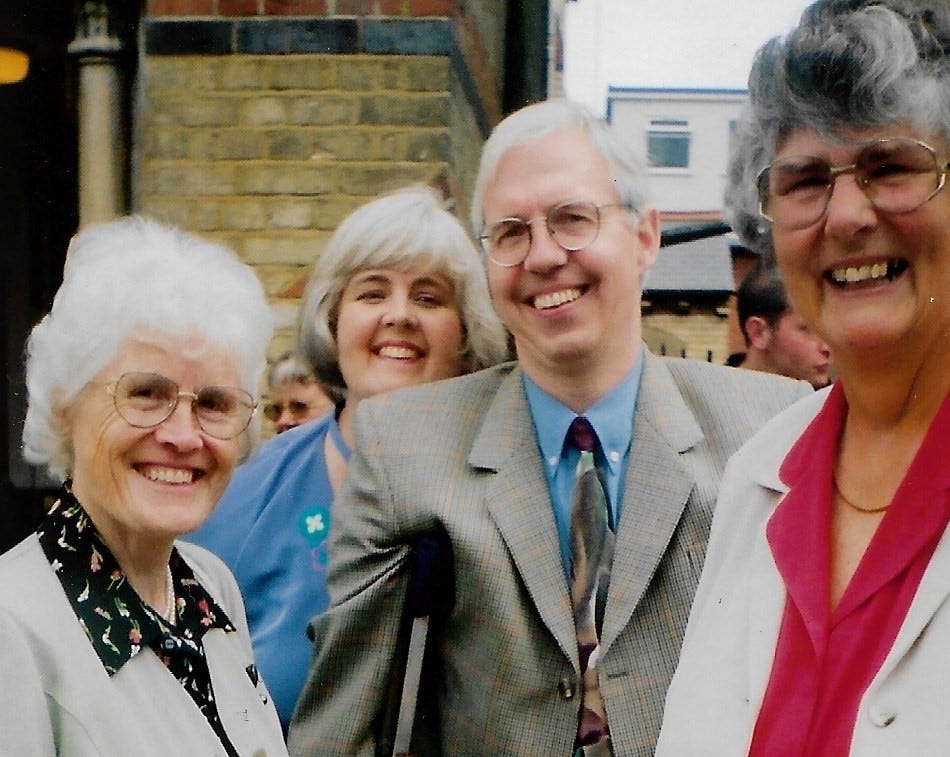
Now
When we took the coffin to the graveside I didn't realise that I was going to have to pall bear, which I've done twice before, for both of my grandparents on my mother's side. I always find it a bit stressful because I can't hold a precious object without imagining deliberately or accidentally dropping it. Somehow laying it beside the grave felt much more final than the service. And the short speech the pastor gave felt much more spiritually connected[7].
Somehow putting her body in the earth felt more final, more real, more right. It's a family plot. It already contained another great aunt and also my great grandparents. There is sort of vertigo to that, thinking of my relatives stretching back in time. I wonder what it would be like if we talked.
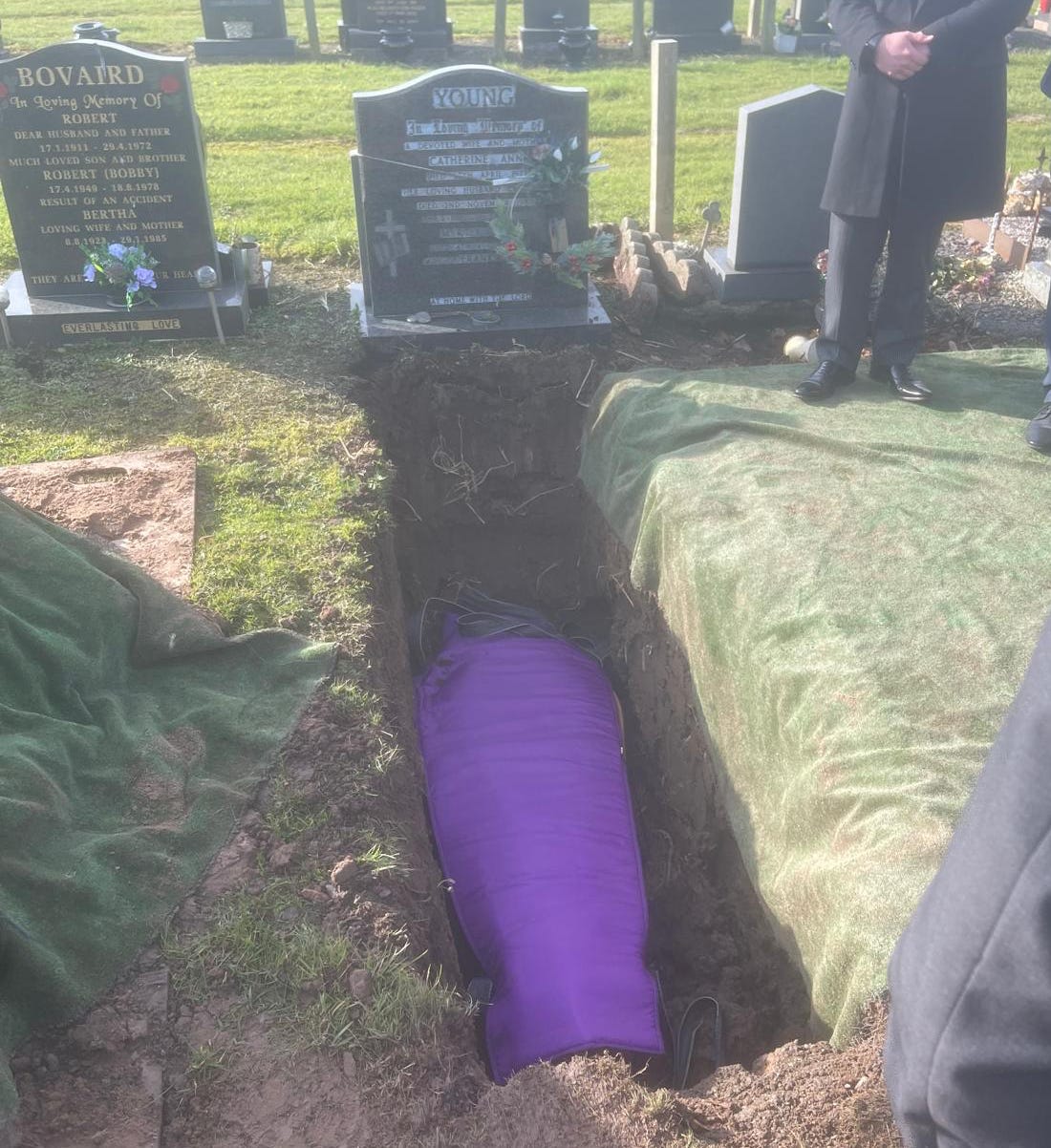
The excavator
Looking into the grave I could see the slick, sharp edges. It had not been dug by shovels. Great chunks of earth had been cut out. By the little digger off to the side, sitting like some strange animal, surrounded by gravestones. The pit had a crushing reality to it. Which stood in stark contrast to the spiritual discussions both in the church and at the graveside. But more than the grave, the excavator. A big dead machine who says, "I'm just here doing a job. I bury people"
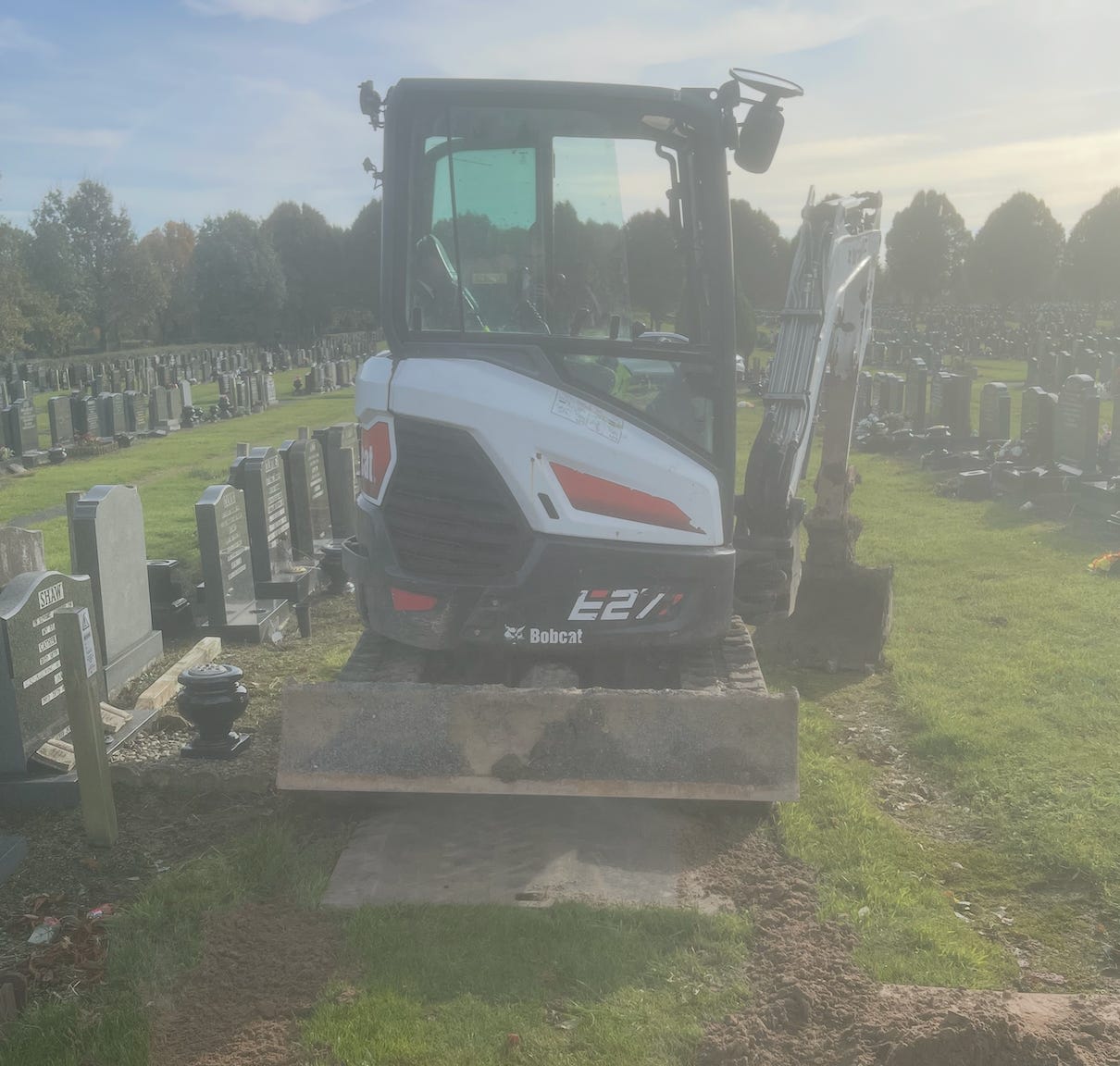
People die. It is the ending of the process of life, in this form. Unless something quite strange happens, it will happen to all of us. And we disagree on what happens afterwards and on the meaning of the pattern before. But the excavator doesn’t disagree; it doesn’t discuss at all - the excavator does not care.
Putting one’s affairs in order
In my view, most things are about priorities.
While I support the eradication of death, and think that death is an abomination, it's not my top priority in a personal sense. I'm more concerned about avoiding death for everyone - making better choices as a civilisation. And so, I guess, I see death as a process to fight, but knowing that some I love will likely die soon, I try to do right by them, and not to have deep regrets.
When my grandmother passed away, I was pretty glad to have recorded a number of videos with her. Things to look back on. So that I can show someone: “This is what Granny was like”. I would recommend it.
When I was at school, one of my friends' fathers died. We went to his very atheist funeral. And that was tragic. He died young, late 40s, early 50s perhaps. And he was a virile chap. And they read what seems like a very atheist funeral reading, by Dylan Thomas:
Do not go gentle into that good night,
Old age should burn and rave at close of day;
Rage, rage against the dying of the light.
And at the time, I remember finding some comfort that however bleak the funeral was, a Christian funeral would have been more joyful[8]. These days, I think the worldview of that funeral was probably more accurate to reality. We don’t know what’s next and so it probably won’t preserve our patterns. I dislike that.
Death is something to be avoided, to be angry at[9], and I respect a funeral that makes that clear. Though I’d like to avoid civilisational death first and then I’ll have time to try to get us all to 1000.
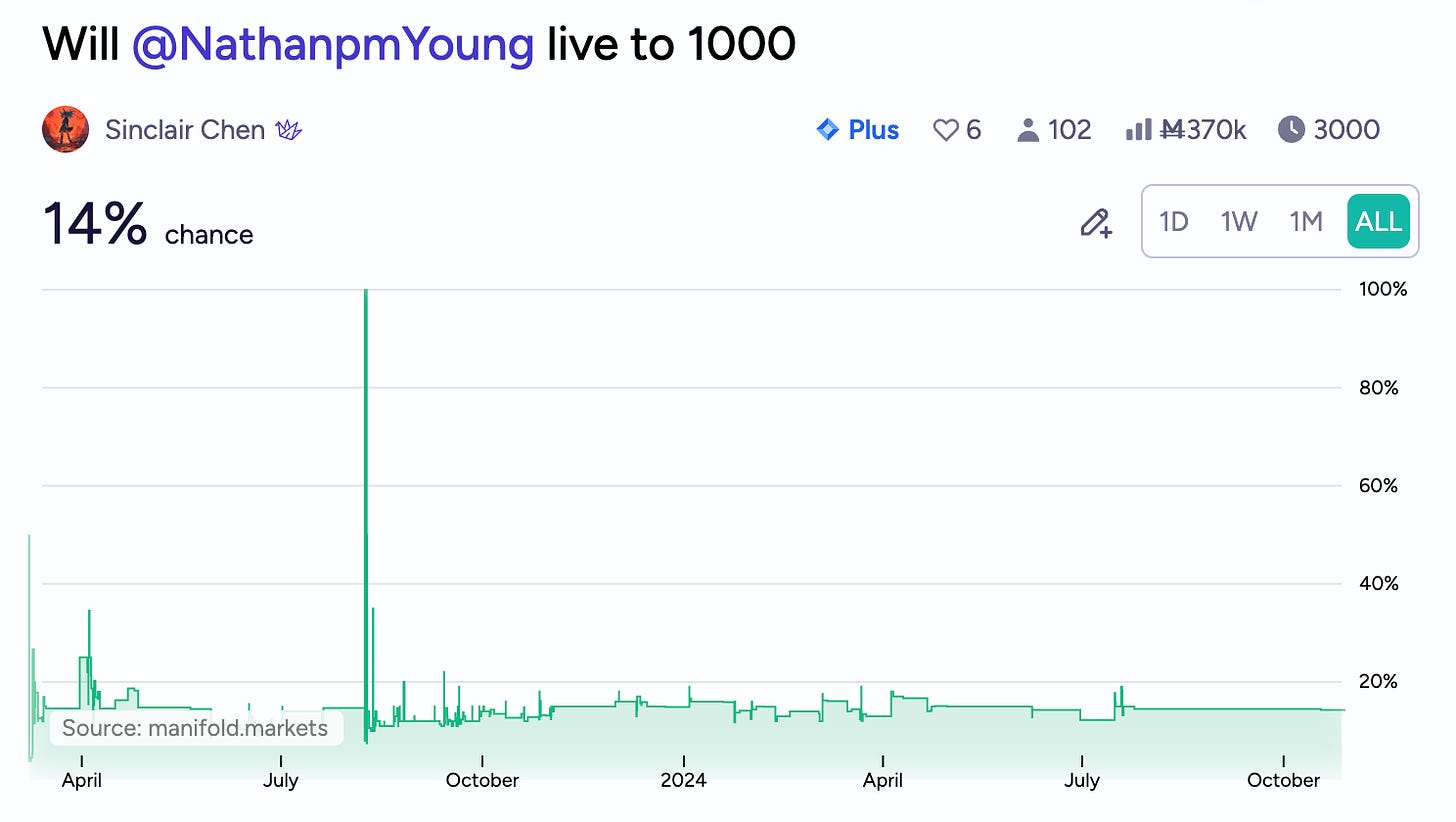
If you want to follow my blogs, the best place is to subscribe here.
- ^
I am sure some philosopher has thought about this carefully. For me, it seems to make sense backwards but not forwards. I cannot be sure that the future Nathan will be me, but I feel a kinship with the past Nathans before me - I am constantly dying but feel I have lived a long time.
This answer seems to behave well under lots of different frames: If I get cloned, both beings will think they are me; if I wake after a dream or cryosleep that person thinks he is “me” too. The person writing things thinks he is Nathan because he has Nathan's memories. If the atoms experiencing consciousness happened to be part of my father (who is driving, beside me)'s brain, then those atoms would experience themselves as being my father. In some sense, I think the whole thing is a bit of a dead end. - ^
Brings a new meaning to "keeping up with the Joneses".
- ^
Because the working ones are working 1000s of hours for every hour of a retiree.
- ^
I am currently writing a story on this.
- ^
Currently the UK has a shared delusion that retirees can be kept alive for ever longer and longer on public pensions at the current rate of taxation. Eventually something looks likely to give.
- ^
Perhaps it was because I didn't know her that well - I was primarily there to support Dad and turn up for the family. But in general I don't feel much at funerals.
- ^
Even if, in my opinion, it's still untrue.
- ^
I don't think I was quite so snotty, but I was a bit.
- ^
I am moved by Eleizer Yudkowsky's comments on his brother's death:
"But Yehuda did not “pass on”. Yehuda is not “resting in peace”. Yehuda is not coming back. Yehuda doesn’t exist any more. Yehuda was absolutely annihilated at the age of nineteen. Yes, that makes me angry. I can’t put into words how angry. It would be rage to rend the gates of Heaven and burn down God on Its throne, if any God existed. But there is no God, so my anger burns to tear apart the way-things-are, remake the pattern of a world that permits this."I created an AI music version of this, which I often hear playing in my head, though it’s sensitive and if you share it unwisely, I will not share things like it again. But I think about it a lot.
1 comments
Comments sorted by top scores.
comment by Gordon Seidoh Worley (gworley) · 2024-10-29T03:25:36.676Z · LW(p) · GW(p)
Thank you for sharing your thoughts, and sorry for your losses. It's often hard to talk about death, especially about the deaths of those we love. I don't really have anything other to say than that I found this moving to read, and I'm glad you shared it with us.